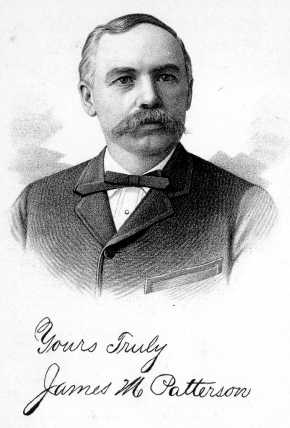
|
|
|||
party. He served four terms in Congress, and won an honorable record as a statesman. He held a commission in the State Militia, and was known as Gen. Patterson. His wife died Jan. 8, 1837. Twelve children had been born to them, of which three died in infancy, and seven sons and two daughters grew to maturity. |
|||
|
|
|
|
|||
County, Pa. Her parents, who were the grandparents of Mrs. Patterson, were David and Jane (Vincent) McGugin, natives and lifelong residents of Pennsylvania, the former dying at the age of eighty-seven years. Mr. and Mrs. Patterson's married life has been blessed to them by the birth of ten children, two of them are deceased: Kate Florence, who was born in Pennsylvania, and died in the second year of her age; and Ella, who was born in Rock Bluff, and died in Plattsmouth at the age of ten years. The names of the other children are Jennie C., James, Thomas M., Samuel, Eliza W., Edith, Charles A. and Rea. Jennie married the Hon. R. B. Windham; James married Grace A. Anderson, and she is assistant cashier in the bank; Thomas M. married Nettie Myers, and is bookkeeper in the bank. The other children are single and at home. James, although only a little over his majority, was elected City Treasurer of Plattsmouth in the spring of 1888, which position he still holds, and fills to the entire satisfaction of his constituency. |
|||
|
|
|
|
|||
condition. While they were away the balance of the division went for Morgan, and helped to capture him at the Ohio River. They then went into camp at Crab Orchard, Ky., where they were again refitted, and sent with Burnside to East Tennessee to keep possession of it, and there took an active part in the siege of Knoxville. They staid there until January, when provisions and provender for the horses gave out. They were in a good many engagements in the valley during the fall and winter, and our subject lost his tent mate, many of his company being killed or dying from exposure. In January his company veteranized, and was sent home on a thirty-days furlough. The suffering of the men had been so great that they were willing to do anything for a few days at home. The soldiers afterward met at Cleveland, and were transported to Cincinnati, and from there ordered to the Potomac. They went to Annapolis, Md., and staid there until ordered to Washington, where they were again re-equipped. On May 1 the company of which our subject was a member was ordered to the front to take part in the Wilderness campaign, being in the thick of those hardly fought engagements, forcing Lee back to Richmond. The army then crossed the river on pontoons, moved on to the south side of Petersburg, then up on to the Weldon Railway. A raid was organized, and our subject and his comrades were into Virginia, destroying rebel railways and supplies for eighty miles. They had more or less engagements all of the time, captured many trains, tore up rails, and burned trains. On their return the enemy got in front of the cavalry, and harassed and divided the company, so that they were forced to cut their way through, some riding hard for three days and nights on circuitous routes, finally bringing up in Union quarters. |
|||
|
|
|
|
|
|
|
|
© 2000, 2001 for the NEGenWeb Project by Pam Rietsch, Ted & Carole Miller



